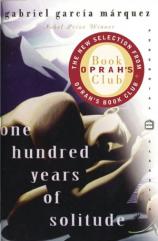Reading Group Guide
Discussion Questions
One Hundred Years of Solitude

1. What kinds of solitude occur in the novel (for example, solitude of pride, grief, power, love, or death), and with whom are they associated? What circumstances produce them? What similarities and differences are there among the various kinds of solitude?
2. What are the purposes and effects of the story's fantastic and magical elements? How does the fantastic operate in the characters' everyday lives and personalities? How is the magical interwoven with elements drawn from history, myth, and politics?
3. Why does Garcia Marquez make repeated use of the "Many years later" formula? In what ways does this establish a continuity among past, present, and future? What expectations does it provoke? How do linear time and cyclical time function in the novel?
4. To what extent is Macondo's founding, long isolation, and increasing links with the outside world an exodus from guilt and corruption to new life and innocence and, then, a reverse journey from innocence to decadence?
5. What varieties of love occur in the novel? Does any kind of love transcend or transform the ravages of everyday life, politics and warfare, history, and time itself?
6. What is the progression of visitors and newcomers to Macondo, beginning with the gypsies? How does each new individual and group affect the Buendias, the town, and the story?
7. What is the importance of the various inventions, gadgets, and technological wonders introduced into Macondo over the years? Is the sequence in which they are introduced significant?
8. What is Melquiades's role and that of his innovations, explorations, and parchments? What is the significance of the "fact" that Melquiades "really had been through death, but he had returned because he could not bear the solitude"? Who else returns, and why?
9. When and how do politics enter the life of Macondo? With what short-term and long-term consequences? Do the social-political aspects of life in Macondo over the years parallel actual events and trends?
10. What types of women (from Ursula and Pilar to Meme and Amaranta Ursula) and what types of men (from Jose Arcadio to Aureliano Babilonia) are distinguishable? What characteristics do the men share? What characteristics do the women share?
11. What dreams, prophecies, and premonitions occur in the novel? With which specific characters and events are they associated, and what is their purpose?
12. When, how, and in what guises does death enter Macondo? With what consequences?
13. On the first page we are told that "The world was so recent that many things lacked names." What is the importance of names and of naming (of people, things, and events) in the novel?
14. How do geography and topography--mountains, swamps, river, sea, etc.--affect Macondo's history, its citizens' lives, and the novel's progression?
15. What aspects of the Buendia family dynamics are specific to Macondo? Which are reflective of family life everywhere and at any time? How do they relate to your experience and understanding of family life?
16. How does Garcia Marquez handle the issue and incidence of incest and its association with violence beginning with Jose Arcadio and Ursula's marriage and the shooting of Prudencio Aguilar? Is the sixth-generation incest of Aureliano Babilonia and Amaranta Ursula inevitable?
One Hundred Years of Solitude
- Publication Date: January 20, 2004
- Genres: Fiction
- Paperback: 464 pages
- Publisher: Harper Perennial
- ISBN-10: 0060740450
- ISBN-13: 9780060740450







